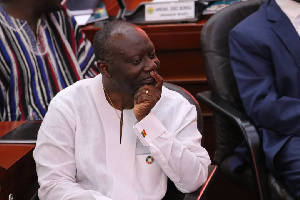The Speaker of Parliament, Alban Bagbin, on Thursday, November 10 announced an ad hoc committee to probe allegations in a vote of censure motion against the embattled Finance Minister, Ken Ofori-Atta.
The 8-member ad hoc committee was constituted of Members of Parliament elected by the leadership of both sides of the House.
Their main task is to probe the seven allegations contained in the censure motion filed late last month by Minority Leader Haruna Iddrisu, which motion is seeking the removal of Ofori-Atta from office.
The committee is expected to submit a report within 7 days.
The composition of the committee is as follows:
It will be chaired by Member of Parliament (MP) for Adansi Asokwa, Kobina Tahir (K.T.) Hammond and the MP for Bolgatanga Dominic Akuritinga Ayine.
The three members from the Minority side are:
MP for North Tongu; Samuel Okudzeto Ablakwa;
MP for Korle Klottey, Zanetor Agyeman-Rawlings; and
MP for Akatsi South, Bernard Ahiafor.
From the Majority caucus, the members include:
MP for Okaikwei Central, Patrick Yaw Boamah;
MP for Asante-Akim Central, Michael Kwame Anyimadu-Antwi; and
MP for Sekondi, Andrew Kofi Agyapa Mercer.
How motion of censure against Ofori-Atta was argued
The Minority Leader filed a motion of censure late last month against Minister for Finance Ken Ofori-Atta.
The motion was duly admitted by Speaker Alban Bagbin and on November 10, the motion was moved by Haruna Iddrisu to trigger debate and a vote on the same.
Speaker Bagbin, however, in his interpretation of the rules the Minority relied on referred the issue to an 8-member ad hoc committee formed to probe the Minority’s claims against the Finance Minister.
The committee co-chaired by Dominic Ayine (NDC) and KT Hammond (NPP) is expected to present their report in seven days, following which the House will proceed with the censure process or otherwise.
Below are the seven points for which the Minority want Ofori-Atta censured:
a. Despicable conflict of interest ensuring that he directly benefits from Ghana’s economic woes as his companies receive commissions and other unethical contractual advantages, particularly from Ghana’s debt overhang
b. Unconstitutional withdrawals from the Consolidated Fund in blatant contravention of Article 178 of the 1992 Constitution, supposedly for the construction of the President’s Cathedral.
c. Illegal payment of oil revenues into offshore accounts, in flagrant violation of Article 176 of the 1992 Constitution.
d. Deliberate and dishonest misreporting of economic data to Parliament
e. Fiscal recklessness leading to the crash of the Ghana Cedi which is currently the worst-performing currency in the world
f. Alarming incompetence and frightening ineptitude, resulting in the collapse of the Ghanaian economy and an excruciating cost of living crisis
g. Gross mismanagement of the Ghanaian economy which has occasioned untold and unprecedented hardship
 Home Of Ghana News Ghana News, Entertainment And More
Home Of Ghana News Ghana News, Entertainment And More




